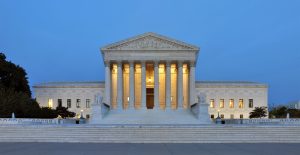
On June 26, 2018, the United States Supreme Court upheld President Trump’s third travel ban in landmark 5-4 decision.
The verdict comes after months of litigation over Trump’s Executive Order 13769, titled “Protecting the Nation from Foreign Terrorist Entry in the United States”.
The ban places entry restrictions on eight foreign countries whose systems for managing and sharing information were considered inadequate by President Trump’s administration: Chad, Iran, Iraq, Libya, North Korea, Syria, Venezuela, and Yemen. As of September 2017, Iraq is no longer listed as one of the countries.
The President issued the order after determining that restrictions were necessary to “prevent the entry of those foreign nationals about whom the United States Government lacks sufficient information” and “elicit improved identity management and information protocols and practices from foreign governments”.
In the ruling, the majority held that President Trump lawfully used his broad powers to prevent the entry of non-citizens into the country. The majority noted that the only requirement for using this power was that the President must find that permitting the entry of certain non-citizens would be detrimental to the interests of the United States.
To determine whether President Trump met this requirement, the majority reviewed the process that the President used to issue the order.
Before issuing the ban, Trump ordered Department of Homeland Security and other agencies to conduct in-depth reports on the seven targeted countries. After a lengthy investigation, the agencies discovered security deficiencies in those countries. In response, President Trump decided that admitting citizens from the seven nations would not be in the national interest because those citizens could not be vetted thoroughly and properly.
In her dissenting opinion, Justice Sotomayor wrote that “a reasonable observer would conclude that the Proclamation was motivated by anti-Muslim sentiments”. She also heavily criticized the majority, writing that their reasons ignore the fact that the Trump administration openly promoted the policy as anti-Muslim.
Dual citizens from one of the restricted countries would not be subject to the travel ban if they were travelling with a passport issued by a non-designated country. The order also exempts permanent residents and provides case-by-case waivers under certain circumstances.
However, the order is unclear about how case-by-case waivers would be obtained and what cost it would be for those who need it to travel to the US. It is known that a waiver will only be granted if denying entry would cause undue hardship, the entry would not pose a threat to the national security or public safety of the United States, and entry would be in the national interest.
The order also states that case-by-case waivers may be issued if all other requirements are met and the person is a Canadian permanent resident who is applying from within Canada.